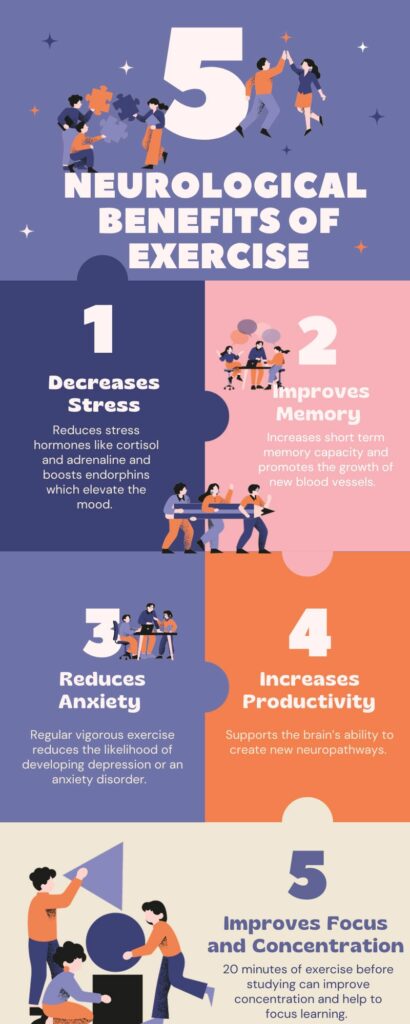Advantages of Exercise for the Cognitive System
Most people are aware of the physical benefits of exercise, but exercise can also have major neurological impacts on our brains and nervous systems. Neurology is, “the branch of medicine that deals with the diagnosis and treatment of disorders of the nervous system.” (Oxford 2023). Students’ brains and neurological systems are subjected to a variety of daily challenges. Learning about the neurological benefits of exercise can motivate students to stay active and teach them how to utilize exercise to their scholastic advantage.
The nervous system is made up of the spinal cord, brain, and peripheral nerves and plays an important role in controlling and coordinating functions of the human body like hearing, cognition, and sensation. Exercise helps to maintain the optimal balance in the brain and can benefit the nervous system greatly.

A few of the benefits include:
Reduced stress
There is scientific backing for the idea that regular exercise lowers stress. Endorphins are natural painkillers that uplift mood and help in better sleep that are released by the body after physical activity.
Improves Memory
Research has found that people who work out regularly have a higher volume of the parts of the brain that control memory in contrast to those who do not. Dr. McGinnis states that regular exercise holds the power to improve memory in a span of 6-12 months (Harvard Health Publishing, 2021).
Reduced anxiety
Exercise reduces anxiety because it clears the mind and eases muscle tension, which calms the body and removes anxiety.
Boosts Productivity
Exercising enhances the overall well-being of the body and also brings alertness and physical vitality which leads to improved performance at work or at school.
Improves focus and concentration
Physical activities lead to better blood flow, reduced stress, and better sleep which helps in improving focus. The mind and body both feel relaxed after releasing muscle tension and getting adequate sleep which directly improves concentration and helps in improved brain function.
The effects covered emphasize the significance of exercise. By decreasing stress, boosting memory, reducing anxiety, increasing productivity, and improving focus and concentration, exercise can benefit students in their studies and help them live a well-balanced life.
Sources
Mayo Clinic Staff. (2020, August 18). Exercise and stress: Get moving to manage stress. Mayo Clinic. https://www.mayoclinic.org/healthy-lifestyle/stress-management/in-depth/exercise-and-stress/art-20044469
Harvard Health Publishing. (2021, February 15). Exercise can boost your memory and thinking skills – Harvard Health. Harvard Health; Harvard Health. https://www.health.harvard.edu/mind-and-mood/exercise-can-boost-your-memory-and-thinking-skills
Ratey, J. J. (2019, October 24). Can exercise help treat anxiety? Harvard Health Blog. https://www.health.harvard.edu/blog/can-exercise-help-treat-anxiety-2019102418096
Publishing, H. H. (2020, October 1). Tips to improve concentration. Harvard Health. https://www.health.harvard.edu/mind-and-mood/tips-to-improve-concentration







